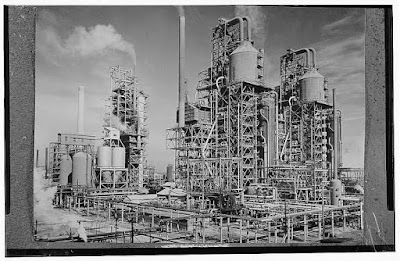Oil Discovery: How did 'black gold' become the world's most valuable commodity?
Oil Discovery: How did 'black gold' become the world's most valuable commodity?
An important message was sent on 27 August 1859. With this message, the patience of US businessman Edwin Drake's financier was lost. The message was something like: 'Pay your debts, admit defeat and go home.
Drake was looking for 'Rock Oil'. It is a kind of brown crude oil whose bubbles were seen on the land of western Pennsylvania.
Drake's intention was to extract kerosene from this 'rock oil' so that the lamps could be lit.
During this period lamps used to illuminate lamps, which were gradually becoming expensive.
Nonetheless, the message was received during excavation before the message was received, and when it came out, its thrust was such that its fountain was reaching 21 meters above the ground.
The incident saved the lives of whale fishermen and began a major change in the world.
One year after the discovery of oil
A few kilometers south of where Drake got the oil, things started to indicate what was going to happen in the future.
According to a New York Times report, when oil was discovered in Pittsburgh, Pennsylvania, in 1864, there were no more than 50 people within a dozen miles.
But within a year of the discovery of the oil, 10,000 people lived in the city of Pit Hole. 50 hotels, one of the country's busiest post offices, two telegram stations and dozens of coffee shops opened.
In the changed conditions, there were few people. But Pit Hole did not meet the other essential requirements of a truly economical city. It turned out that within a year, the hole in the pit had disappeared.
Depending on the pit hole oil economy could not hold the pressure, but our thirst for oil increased and increased.
The global need for energy
Now the situation is such that it can be said that the world economy is better than oil and it meets one-third of the world's energy demand.
It is more than coal and doubles its combined capacity for nuclear, hydro and non-conventional sources of energy.
Oil and gas account for a quarter of our energy demand. Not only that, but it also provides the raw material for the plastic sector.
In addition, there was the transport department. Edwin Drake wondered who would buy the gasoline, but Combustion Engine answered his question.
From cars to trucks, freight ships to jets, it's the oil that is driving our world.
It is not surprising that the price of oil is perhaps the most important price in the world on which other prices depend.
In 1973, when some Arab countries announced a ban on oil sales to certain wealthy countries, the price of oil rose from $ 3 a barrel to $ 12 in just six months.
After that, the economic slowdown was visible all over the world. After the rise in oil prices in 1978, 1990 and 2001, the United States faced an economic crisis.
Some economists believe that a record rise in oil prices was the cause of the global economic crisis of 2008 while blaming the banking crisis.
As the price of oil goes up, economies also take the same route. But the question arises: Why do we rely so much on it?
Daniel Yergin's book 'The Prize' on the history of oil begins with Winston Churchill's difficulty. In 1911, Churchill was appointed a chief of the Royal Navy.
It was one of the few early decisions aimed at determining whether the Kingdom of Britain faced the challenge of expanding Germany with new coal-fired vessels from Wales, the reserves or the remote Persian (present-day Iran) oil. Will you be able to?
How can one trust such insecure sources? Because the oil-powered warships were built in a hurry and needed fewer people. He had more ability to carry weapons and ammunition in warships.
Better fuel oil than coal
Churchill's decision in April 1912 was a reflection of the logic that we depended heavily on oil and that has changed the course of global politics ever since.
Following Churchill's decision, the British Treasury bought a majority stake in Anglo-Persian Oil Company, a predecessor of BP (British Petroleum).
In 1951, the Iranian government made it a national oil company. The British protested, 'This is our company.' Iran replied, 'This is our oil.' And again in the future, the same debate was repeated all over the world.
Some countries have done very well in the oil sector. Saudi Arabia is one of the richest countries on earth thanks to its large oil reserves.
Its publicly-owned oil company, Saudi Aramco, is worth more than the American company Apple, Google or Amazon.
Aramco is the world's most lucrative oil company that was recently subjected to 'drone' attacks. (This can lead to high oil prices.)
However, no country will be confused about the complex economy of Saudi Arabia, like Japan or Germany. Maybe it's a little more like a massive pothole.
Oil-rich countries, from Iraq to Iran and Venezuela to Nigeria, thanked them for the discovery. But economists call it the 'oil curse'.
This was explained more clearly by the Venezuelan Minister of Petroleum Juan Pablo Perez Alfonzo in the early 1960s. He said in 1975, 'This is the devil's stool' and 'We are drowned in the stool of the devil.
Why is there such a problem with oil?
Exporting it increases the value of your currency and can make everything in the country more expensive than oil.
This means that manufacturing or developing complex product industries can be difficult.
Historically, many politicians have tried to establish a monopoly on oil for themselves and their allies. Dictatorship is not uncommon There is money for some, but it weakens the economy.
That is why we hope to use something other than oil. Climate change is clearly another issue.
But oil sits in place of batteries. The reason for this is that for running machines it must have its own source of energy and light.
One kilogram of gasoline has the same amount of energy as 60 kilograms of battery and it can also be used after exhaust. But alas, empty batteries are just as heavy as loaded batteries.
Electric cars have finally broken down. Electric jumbo planes are a difficult challenge.
There was a time when it seemed like oil prices would be out of control. It was called 'pack oil'. It worked to raise prices quickly and encouraged us to move towards a clean and renewable economy.
But the fact is that oil is being discovered much sooner than it is today.
This is part of the rapid development of hydraulic fracturing or 'fracking'. It is a controversial process wherein water, sand and chemicals are pumped into the ground with greater force to release oil and gas.
What is fracking and why so much opposition to it?
Fracking is more like manufacturing than conventional oil exploration and production.
It is standard to rapidly-produce productive profits and this process starts and stops based on cost accuracy.
Many critics have expressed doubts about its potential long-term environmental impact.
Although Permian Basin, America's main fracking industry, already produces more than 14 member countries of the Organization of the Petrol Exporting Countries (OPEC), besides Saudi Arabia and Iraq.
It seems we are still drowned in the 'devil's stool' and this may continue for a while.









No comments:
Thank you for your feedback.